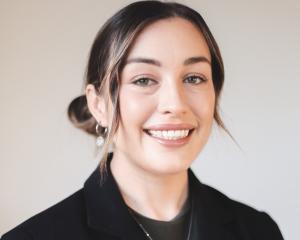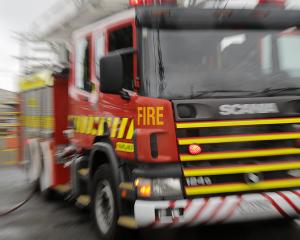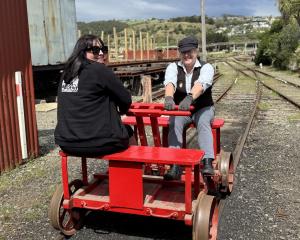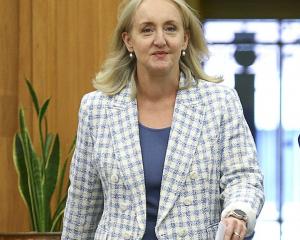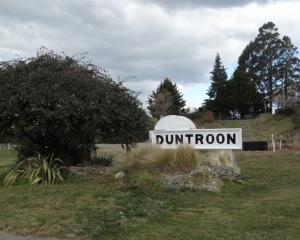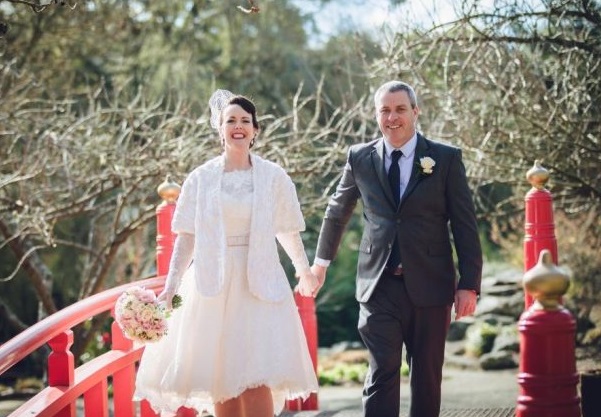
The 33-year-old former Oamaru woman knew it was going to be a mental challenge as much as it would be physical, and naming her cancer gave her a way to separate herself from it.
“It also doubled as a way for people to talk to me about my cancer without getting really awkward,” Mrs van Dijk said.
“Lets face it, when you talk to someone with cancer, would you rather say ‘how’s your cancer?’ or ‘are you kicking Brad’s ass?’.”
Why Brad Pitt?
“In my 20s, I named the ‘girls’ Thelma and Louise – who doesn’t name their body parts after a few cocktails?” she said.

“In the movie Thelma and Louise, Brad Pitt is mean to Thelma [and] because my cancer was in my right breast [named Thelma], I called it Brad.”
It was January 2018 when Brad first made his presence in Mrs van Dijk’s life known.
“I felt a lump in my breast completely by accident one night laying in bed,” she said.
She promptly got it checked out and was referred to get an ultrasound, then two biopsies and, finally, an appointment to discuss the results with a specialist.
As she walked into the appointment, she was prepared for the worst but hoping for the best.
“There was a big pause after the specialist had translated all the medical jargon into ‘so it’s triple negative breast cancer’,” she said.
“My husband’s hand just came over into mine and I asked ‘what stage is it?’.”
It was probably stage two, she was told.
“I just remember feeling a shift like ‘right, let’s get this s… sorted – let’s get this show on the road’,” she said.
A mountain of paperwork and fertility treatment followed.
She had just enough time to do a round of IVF before starting her first of six rounds of chemotherapy, then surgery to remove any remaining tumour and radiation.
At the same time, Mrs van Dijk and husband Adder, who had been married for five months at that stage, had just committed to building a house and needed to decide on the kitchen’s colour scheme. They had planned on visiting some showrooms after the appointment.
“I’m not sure what one normally does after being told that, at 32, you’ve got an aggressive type of breast cancer trying to kill you, but . I told the husband that everything would just have to wait until we’d visited the kitchen showrooms and picked our colours,” she said.
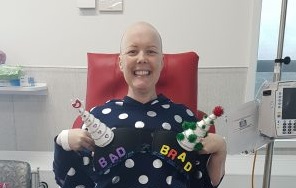
After the kitchen was sorted, she knew she had to start telling people.
Starting a conversation with “I have some news” five months after getting married, most people assumed she was calling to say she was pregnant.
“So it became ‘hi, I’m not pregnant, but I have some news – don’t freak out, but I have breast cancer’.”
For surgery, she was given several options: a lumpectomy, also known as a partial mastectomy, a single mastectomy with reconstruction, or a double mastectomy with reconstruction.
“After changing my mind again and again and again, I went with a lumpectomy,” she said.
While Mrs van Dijk had maintained her positive outlook on life, she admitted the past year had been incredibly difficult.
Faced with such adversity, she found her strength from those around her – especially her husband, family, friends, her oncologist and Shocking Pink, a group for young women in New Zealand with breast cancer.
“It feels like as soon as someone is diagnosed with cancer, there’s this support crew that have just been randomly waiting on the sideline that spring into action,” she said.
A friend’s mother whom she had never met sent her a quilted “survival blanket” and an old work colleague whose mother had died from breast cancer sent her a Trelise Cooper jacket with a personal message embroidered into a patch on the lining.
She also found an escape in the small things.
“Something as simple as when you hang your washing, you close your eyes and feel the sun on your face and you escape for five seconds,” she said.
“When I was having radiation I would lay down on the table and in the roof there were a few panels that had been replaced with ones with palm trees in them, so I used to pretend I was topless sunbathing in Rarotonga.
“You always see the world the way you are, not the way the world is.”
Everyone who went through cancer had their own way of dealing with it, she said.
Privately, openly, quietly or loudly – there was no right or wrong way.
Mrs van Dijk grew up in Oamaru and attended St Joseph’s Primary School, where her mother, Ann, still teaches.
Her high school days were spent at St Kevin’s College and at the weekends, she could often be found with her father, John, helping to sweep up limestone dust off the floors at Dooleys Masonry.
After travelling the world, she studied travel and tourism at Otago Polytechnic and then moved to Queenstown, where she worked at Shotover Jet and Shotover Canyon Swing.
She also worked for Kiwi Experience, driving backpackers around the country. In 2014, she moved to the Bay of Islands to take on the role of campus administrator for Queenstown Resort College Culinary.
To keep family and friends in the South updated on her progress after she was diagnosed with cancer, she started posting on Instagram.
“I put photos up and would write a wee blurb about how I was going,” she said.
“I was honest and didn’t sugarcoat anything – if it was a day where it took me three naps to get through the dishes, then I put that up.”
While doctors, chemotherapy, surgery and radiation “cured” her cancer, it was finding an online community of support that really healed her.
“I became part of this little cancer community online. I started getting messages from people who were in the exact same boat, offering advice on what they do in that situation,” she said.
“I even found my radiation twin – a girl called Kara, from England, who had named her cancer Brian, and she started and finished radiation on the exact same dates that I did.”
While no-one had spoken the words “you are cancer-free” or “you are in remission” to Mrs van Dijk, she said doctors were satisfied they had got it all when they removed the tumour.
She would be monitored closely for the next two years to make sure there was no reccurrence.
“I have a report card from my surgery that says ‘zero lymph node involvement’ so the cancer hadn’t spread,” she said.
“The chance of reccurrence is highest within the first two years for triple negative breast cancer, so if you get to two years and you haven’t had a reccurrence, then that’s good.”
Physically, she said she felt about 80 years old but getting younger by the month – and she had a new appreciation for life.
“It’ll just hit me randomly, like when someone is embarrassed to admit their age, or complains about how grey their hair is .. when I had no hair, I would have killed for a head of grey hair,” she said.
“But I also think I’m stoked that [they] don’t think the way I do. It, hopefully, means [they’ve] never had to go through, or watched someone go through, what I have.”
Now, just over one year on from her diagnosis, she said she was looking forward to getting her health back on track and a holiday to Rarotonga.
As for Brad, Mrs and Mr van Dijk are hoping to never hear from him again.
“On our first wedding anniversary I did say that I felt like cancer robbed us of our first year of marriage. We’ve not had a chance to really think about anything else other than Brad,” she said.
“If Brad Pitt ever reads this, don’t take it personally. It’s not you – it’s me.”
Rebecca’s top five tips to support someone with cancer
➊ Frozen meals and working bees are a godsend. It’s awkward asking for, or accepting, help, so just go ahead. Ask if there is anything we can’t eat as certain treatments may have food restrictions. Whip up a meal for the freezer and leave it on the doorstep. Nothing fancy — if we are going through chemotherapy we’ve probably lost our tastebuds, anyway. Get a group of friends together and tell the person you will be at their house on Saturday afternoon at 2pm and they are to shout instructions from the couch only. Mow the lawn, walk the dog, fold the laundry, take their kids to the movies.
➋ We are still the same person. Please keep talking to us about the dramas in your life — your dramas are just as important to us as they ever have been. Don’t compare, it’s all relative.
➌ No-one knows the right thing to say to someone diagnosed with cancer. If you think it’s hard reaching out to someone with cancer, try having cancer and not hearing from someone you’re close to — it sucks. A simple ‘I heard your news, that sucks. I’m thinking of you’ meant the world to me. It’s also OK to ask questions about cancer. If we don’t want to talk about it we will soon change the subject to something else.
➍ Please don’t send links to a cure you came across online, or ask why they are doing chemotherapy over natural options. If eating 10kg of kale a day and rolling in turmeric was scientifically proven to kill my cancer, I’d be all over that in a heartbeat. Alternatively, if someone has chosen the natural approach, that will be the best course of action for their specific situation. We are all different. Not only that, but some treatments are not available to us in New Zealand. It’s a kick in the guts when you read about medicines that could potentially save your life that will cost a New Zealander 10s, if not 100s, of thousands of dollars, yet are publicly funded in other countries.
➎ Don’t forget that our main support person needs support as well. Our nearest and dearest often end up the primary caregiver by default. Husband, wife, partners, parents — keep an eye on them, too.


